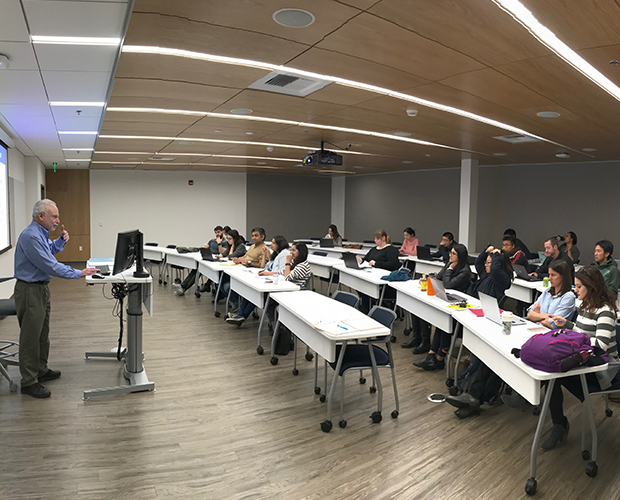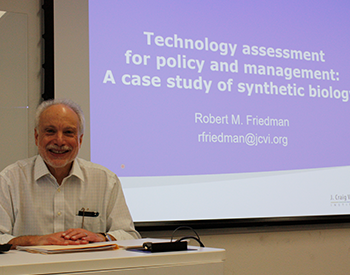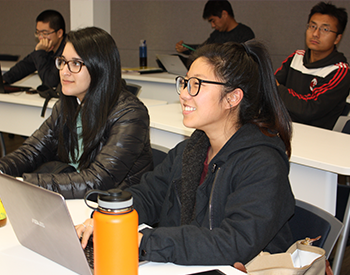Technology assessment at the nexus of STEM and policy

GPS students and alumni learn how to assess genetic engineering at the intersection of policy and regulation
Jan. 25, 2018 | By Rachel Hommel | GPS News
Robert M. Friedman knows a thing or two about the environment and policy. Before joining the J. Craig Venter Institute (JCVI), he was a senior associate at the U.S. Congress Office of Technology Assessment. For 16 years, he advised Congressional committees on issues involving environmental and natural resources policy.
Currently at JCVI, he is vice president for Policy and University Relations, directs the Policy Center and is active in several ongoing projects in their Environmental Genomics Group.
 Enter Professor of Practice Friedman’s class at the UC San Diego School of Global Policy and Strategy (GPS) and you are welcomed with a smile and a sincere passion for all things science and policy.
Enter Professor of Practice Friedman’s class at the UC San Diego School of Global Policy and Strategy (GPS) and you are welcomed with a smile and a sincere passion for all things science and policy.
“There is so much 21st century biology happening in San Diego. It was natural to add that sort of focus to the GPS curriculum,” said Friedman. “Synthetic biology is next generation genetic engineering and we are developing it in real time.”
Open to all GPS students, alumni and those interested in bioengineering, the certificate course is divided into five sessions including an overview of synthetic biology, dual use concerns, environmental and human health concerns, international governance of synthetic biology and using “gene drives” to rewrite the genetic code of mosquitos.
"Friedman bridges the disciplines, offering students an opportunity to work with a top practitioner in the field of STEM and policy," said GPS Dean Peter Cowhey. "We were thrilled to invite Friedman to GPS, as part of our effort to offer more professional development resources for our students in current, cutting-edge issues."
Hoping to close the gap between physical and social sciences across campus, the course was opened to STEM students across UC San Diego, particularly bioengineering and biology Ph.D. candidates and postdoctoral scholars, to provide for richer discussion.
For Eunji Kim, 2019 Master of Public Policy candidate, she hopes to work in an organization that looks at biotechnology through a public policy lens and helps to develop efficient and impactful collaborative measures between government and science sectors.
“The collaboration between bioscience/tech and policy drew me to this course. As a new and emerging field, this certificate course will help lay a foundation of how bioscience and policy work,” said Kim. “This course is helping me learn about the different organizations and professions related to biotechnology, as well as policy framework and the future of policymaking in this field.”
Looking at issues of regulations in the 21st century, the course highlights readings and studies on governance and regulation as well as concerns and controversies over DNA synthesis and biosecurity. Friedman highlights that the case for synthetic biology is truly at the intersection of STEM and policy. Because of rapid advancement, new technologies are having to be governed and managed daily, from biotechnology to science for environmental policy.
 “There is a lot of opportunity and need for students educated from a policy perspective to focus on these issues, whether it’s working in Washington, D.C. or at a nonprofit or research institutions,” said Friedman. “I hope this five-week course can help inspire them.”
“There is a lot of opportunity and need for students educated from a policy perspective to focus on these issues, whether it’s working in Washington, D.C. or at a nonprofit or research institutions,” said Friedman. “I hope this five-week course can help inspire them.”
Alumna Darcy Cook ’91, who focused on environmental policy while at GPS, couldn’t agree more. Having followed the Venter Institute and its work on synthetic biology from its inception, she jumped at the opportunity to participate in the certificate program.
“The policy aspects of synthetic biology are complex and increasingly so, as research developments push the limits of our philosophical and ethical understanding of life,” said Cook. “This course showcases the depth and breadth of GPS engagement on the triad of policy, research and education at UC San Diego, in San Diego county and globally.”
In the last class, Friedman cites UC San Diego’s Tata Institute for Genetics and Society, which is working to engineer mosquitos to combat malaria and other insect-borne disease, rewriting genetic code and the rules of inheritance in this 21st centurybiotechnology.
“What used to require months or years of effort preparing DNA to do an experiment, you can now order,” said Friedman. “There’s been a real change in speed and scale of the science. In this rapidly moving technology, governance and regulation will be critical.”

